 Papua New Guinea : Safety by City
Papua New Guinea : Safety by City
Papua New Guinea (PNG) is one of the most culturally and geographically remote countries in the world, where over 800 languages are spoken and jungle-covered mountains cut off entire communities.
It sits just above Australia, claiming the eastern half of the island of New Guinea, while its western neighbor is part of Indonesia.
Getting around is no small task. Many villages can only be reached by plane, boat, or long hikes through dense forest.
This isolation is part of what’s kept its traditions intact.
Colonial rule shaped the early modern era, split between Germany and Britain in the late 1800s, then handed over to Australia after World War I.
Independence was achieved in 1975, but the decades since have been marked by conflict, particularly on the island of Bougainville, where calls for secession persist.
Tribal violence and political instability still affect parts of the country today.
Despite the challenges, 144,000 people visited in 2023, primarily from Australia, with growing numbers from the United States and China.
They come for the unmatched biodiversity, coral reefs, volcanic peaks, and the chance to witness cultures that haven’t been flattened by mass tourism.
Before you get too excited, we have some serious safety concerns to discuss about this untamed and raw landscape.
Warnings & Dangers in Papua New Guinea

OVERALL RISK: MEDIUM
Travel in Papua New Guinea comes with a medium level of risk. It's not a destination for the casual traveler. Tribal conflicts, limited infrastructure, and unpredictable conditions mean you need to stay alert and flexible. Most trips go fine, especially with a guide, but it's not a place where you want to wing it.

TRANSPORT & TAXIS RISK: HIGH
The risk level for getting around is high. Public transportation is chaotic, and PMVs (public motorized vehicles) are often unsafe. Taxis are unregulated and hard to trust unless arranged through a hotel. Flying is usually the safest and most reliable way to travel between regions.

PICKPOCKETS RISK: HIGH
Pickpocketing is a big issue here, especially in crowded areas like markets, beaches, and parks. Some thieves will be brazen enough to open car doors and snatch personal items. Keep car doors locked.

NATURAL DISASTERS RISK: MEDIUM
The risk of natural disasters is medium. PNG sits on the Pacific Ring of Fire, so earthquakes, volcanic eruptions, and landslides are all on the table. If you're heading into remote or highland areas, have a way to stay in touch with weather and news updates.

MUGGING RISK: HIGH
Muggings are a high risk, particularly in Port Moresby and Lae. These aren’t petty crimes. Some reports of brutal attacks will make you think twice about visiting. Don’t walk alone, especially at night, and avoid carrying anything valuable.

TERRORISM RISK: LOW
The traditional risk of terrorism is low, but with civil unrest, risks to travelers in rural areas, and growing crime rates, you'll need vigilance beyond the standard.

SCAMS RISK: MEDIUM
Scams are a medium risk. You won’t run into too many classic tourist cons, but inflated prices and shady tour operators are common. Book through known hotels or agencies. Online scams targeting foreigners are on the rise, so avoid engaging with random messages or requests.

WOMEN TRAVELERS RISK: HIGH
This is a high-risk destination for solo female travelers. Harassment and violence are serious concerns in both cities and rural areas. The United States warns that sexual assault risks increase substantially if a woman travels alone. Even Canada's advisory goes as far as saying that, "Sexual assault, including gang rape, frequently occurs." Check if your hotel has a floor just for women to give another layer of safety.

TAP WATER RISK: HIGH
The tap water risk is high. Contamination is widespread, and drinking it can land you with a severe stomach illness. Stick to bottled or boiled water, even for brushing your teeth. Avoid ice and any items that may have been rinsed in tap water.
Safest Places to Visit in Papua New Guinea
The Papua New Guinea Tourism Promotion Authority runs the official travel website papuanewguinea.travel.
Start with the More Info section to get a lay of the land and the rules, as you’ll see hidden fees and specific rules to follow.
Papua New Guinea’s top attractions are spread across four main regions, each offering something different depending on what you’re into.
While we’ll highlight the key points, please continue reading to discover additional safety tips that complement these adventures.
In the Highlands, visitors come for cultural festivals and striking landscapes.
The Mount Hagen Show is the big draw here, with tribes from all over the country performing traditional song, dance, and dress.
The area around Goroka also offers strong cultural experiences and coffee plantations worth visiting.
The Islands Region is where you’ll find clear water, coral reefs, and some of the best diving in the world.
Places like Rabaul and East New Britain offer volcanic landscapes, a rich WWII history, and a more laid-back atmosphere.
This is the go-to region for snorkeling, wreck dives, and beach escapes.
Momase includes the town of Madang, known for its coastal charm, diving spots, and offshore islands.
The Sepik River region also falls within this area.
If you’re curious about tribal art, carvings, and river life, this is the place to explore.
The Papua Region encompasses the capital, Port Moresby, and areas such as the Owen Stanley Range.
The Kokoda Track begins here, a historic and challenging multi-day trek that is popular among hikers.
There are also birdwatching opportunities, national parks, and cultural centers that provide a solid introduction to PNG.
Places to Avoid in Papua New Guinea
If you’re headed to Papua New Guinea, there are areas you should avoid altogether.
The Highlands Region has seen deadly tribal violence, especially in Enga, Hela, and the Southern Highlands.
The United States travel advisory lists the Highlands as Level 4: Do Not Travel.
The only exceptions are Mt. Hagan and Goroka, which remain at Level 3 warning.
Armed clashes in Porgera Valley led to a state of emergency, curfews, and a ban on alcohol.
Bougainville’s Panguna mine area is at the Level 4 risk level due to civil unrest.
Even the police won’t respond there.
Port Moresby and Lae also carry high risks. Crime in both cities is serious, including armed robberies, carjackings, and home invasions.
Areas such as Waigani and the routes between Lae and the airport are especially hazardous.
Even going boating around PNG is risky, with an uncomfortable number of piracy reports.
Safety Tips for Traveling to Papua New Guinea
- Police coverage in Papua New Guinea is limited. In cities like Port Moresby, you can dial 000 for emergencies, but response times may vary. There is no dedicated tourist police force, and outside major towns, the law enforcement presence drops sharply.
- There’s no national alert system for travelers, so you’ll need to be proactive. Sign up for alerts from your country’s embassy, monitor local news outlets, and check in regularly with hotel staff or guides. For natural disasters, radio updates and social media from local authorities or news stations are often the most current sources.
- You can drive in PNG with an international driver’s permit, but most visitors are advised not to. Roads are often unpaved, poorly maintained, and dangerous, especially at night. Landslides and carjackings are real risks. Even in cities, traffic is chaotic.
- Squatter settlements are informal neighborhoods, often built without government oversight, and can be found on the outskirts of towns and cities. These areas lack basic services and have high crime rates. They are not safe for visitors, even during the day. Stay in recognized hotels and travel only along established routes.
- English is one of PNG’s official languages and is used in schools, government, and business, but that doesn’t mean you’ll get by easily. In rural areas, Tok Pisin is more common, and beyond that, over 800 local languages are spoken across the country. You can’t just memorize a few words and expect smooth communication. Having a local guide is often the only way to truly understand what’s happening around you.
- Even simple outings, such as visiting a market or restaurant, should be done in a group. The U.S. government strongly advises against going anywhere alone. A guide who knows the region can help you avoid unsafe areas and navigate local customs. In rural zones, a guide is essential for safety.
- Make sure you’re up-to-date on routine vaccines, as well as hepatitis A and B, typhoid, and possibly rabies if you’ll be in rural areas. Malaria is a risk in many parts of the country. Bring mosquito repellent, a first-aid kit, and any medications you can’t go without, as pharmacies may have limited stock.
- Trekking in PNG isn’t like hiking in a national park back home. Trails can cross disputed land, and attacks on hikers have been reported. Weather shifts quickly, and remote trails lack cell service. Always go with a vetted guide and check with locals before setting out—some trails close without notice.
- Not all snorkeling and dive guides meet international safety standards. If you’re diving, check if the operator is registered with the PNG Divers Association or another legitimate body. Gear quality, emergency plans, and training can vary. Don’t assume you’re in good hands without doing your homework.
- Same-sex relationships are criminalized in PNG, and public displays of affection, even between heterosexual couples, can attract negative attention. It’s a deeply conservative country, especially in rural areas. Keep physical affections private, dress modestly, and avoid discussing sexuality or gender politics unless you’re sure it’s safe to do so.
So... How Safe Is Papua New Guinea Really?
While travel advisories from various countries run the gamut of risk levels, there are plenty of consistencies showing how unsafe this country can be.
Generally, countries like the United States, Canada, and Australia list an overall risk level.
This can help their citizens plan trips, knowing the full weight of risks.
The four-tiered scale goes from Level 1, being the lowest, to Level 4, being the highest.
Here’s where things get interesting in PNG.
Let’s look at the risk level breakdown by country.
- Australia: Level 2 | Exercise a High Degree of Caution
- Canada: Level 3 | Avoid Non-Essential Travel
- United States: Level 3 | Reconsider Travel
- United Kingdom: FCDO advises against all but essential travel to parts of Papua New Guinea.
Australia’s advisory might sound softer than the U.S. or Canada’s, but that doesn’t mean PNG is any safer for Aussies.
It’s more about how familiar they are with the country.
Most of PNG’s tourists and business travelers come from Australia.
That gives the Australian government more boots on the ground, more intel, and stronger local ties.
They know the lay of the land better and can step in faster if something goes sideways.
The U.S. and Canada don’t have that kind of presence, so their travel warnings are more cautious by default.
Fewer people visiting means less direct experience to draw from, and that shapes how they issue alerts.
All that said, the risks in PNG are plentiful and quite intimidating in some instances.
Even Australia’s advisory notes that, “Criminals often use ‘bush knives’ (machetes) and guns (including homemade ones).”
The leaders and tourism officials in the country know that tourism won’t increase until the country is safer.
“There can be no tourism in the country without peace in our communities,” Minister for Tourism, Arts, and Culture, Hon. Belden Namah, said in late 2024.
The low tourism numbers reflect the risks here, and this is definitely a trip you shouldn’t consider unless you have a reliable and trusted guide to get you through every pain point.
How Does Papua New Guinea Compare?
| Country | Safety Index |
|---|---|
| Papua New Guinea | 47 |
| Djibouti | 38 |
| Croatia | 83 |
| Mexico | 65 |
| France | 64 |
| Puerto Rico | 34 |
| Somalia | 16 |
| United Kingdom | 77 |
| Peru | 50 |
Useful Information

Visas
Most travelers need a visa to enter Papua New Guinea. Some nationalities can apply online for an eVisa, while others must get one in advance from a PNG embassy. Visa-on-arrival is limited, so don’t count on it. Check the latest rules well in advance of your trip. Requirements can change without much notice.

Currency
Papua New Guinea uses the kina (PGK). Credit cards are accepted in larger hotels and restaurants, but cash is essential in rural areas. ATMs are available in cities, but they can sometimes run out of funds or break down. Exchange money at the airport or a bank when you arrive, and don’t expect to use U.S. dollars outside major hotels.

Weather
PNG is tropical and humid throughout the year, with regional variations. Expect heavy rain from December to March, especially in coastal areas. The Highlands are cooler, while the Islands are warmer and more humid. Always check local forecasts, especially when planning outdoor activities such as hiking or diving.

Airports
Jacksons International Airport in Port Moresby is the main entry point. Domestic flights connect most regions since roads are limited. Be prepared for delays because weather and logistics often disrupt schedules. Regional airports are typically small, so pack light and confirm baggage limits with the local carrier.

Travel Insurance
You absolutely need travel insurance here. Medical facilities are limited, especially outside cities, and medical evacuation can be expensive. Confirm your policy covers emergency transportation, accidents, theft, and trip disruptions. Without insurance, getting help in an emergency could be complicated or entirely out of reach. Also, note that traveling to areas listed as "Do Not Travel" could void any insurance policy immediately.
Papua New Guinea Weather Averages (Temperatures)
Average High/Low Temperature
| Temperature / Month | Jan | Feb | Mar | Apr | May | Jun | Jul | Aug | Sep | Oct | Nov | Dec |
|---|---|---|---|---|---|---|---|---|---|---|---|---|
| High °C |
31 | 31 | 31 | 31 | 30 | 29 | 29 | 29 | 30 | 31 | 31 | 31 |
| Low °C |
24 | 24 | 24 | 24 | 23 | 23 | 22 | 22 | 23 | 24 | 24 | 24 |
| High °F |
88 | 88 | 88 | 88 | 86 | 84 | 84 | 84 | 86 | 88 | 88 | 88 |
| Low °F |
75 | 75 | 75 | 75 | 73 | 73 | 72 | 72 | 73 | 75 | 75 | 75 |
Papua New Guinea - Safety by City
| City | Safety Index |
|---|---|
| Port Moresby | 55 |
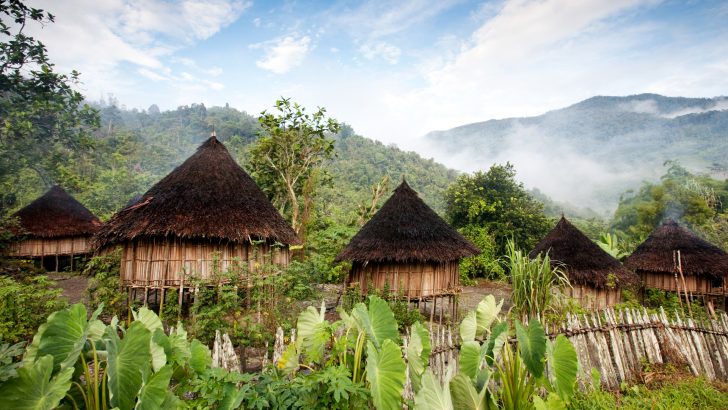
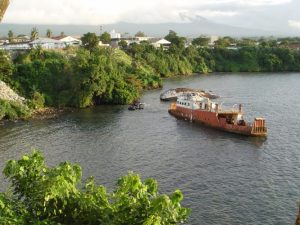
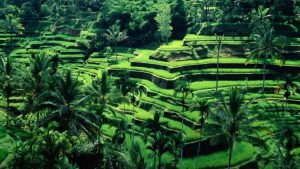
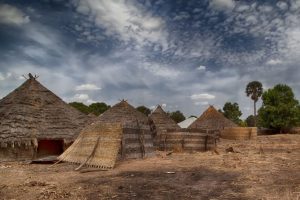
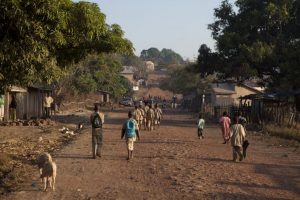
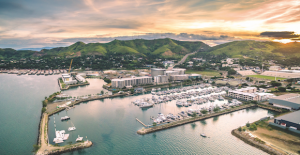
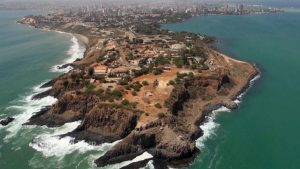





Not for inexperienced travelers
If you are not an experienced traveler, do not go to Papua. I have been here a few times but I travel for work and I know the area, know the dangers, and know how to avoid trouble. For everyday people just looking to travel, I would advise going to a different city in New Guinea.
We lived in Mt Hagen back in 1990 for 5 years and were able to experience and stay in villages . My job entailed a lot of work in Helecopters also driving the many roads in the district. Our time over there was life changing for us , memories stay for a lifetime.
Yes , we were held up at gunpoint and roadblocks but were fortunate enough to survive them all . After having a bad experience , it was thought that you would be on the next flight out , which many expats did . Crime was , back then , very common, o breaking into your home was always a reality , hence everyone had 24 hour security guards .
Although they only carried bush knives a bows and arrows , no match for the gangs that carried AK 47 s?
We are still in contact with friends that still live there , and yes , it has deteriorated so bad that their advise is , stay away if you value your safety. Your whole time there will be behind a security fence.
Not for the feint of heart
Travelled around the highlands for a few months. Definitely not for the inexperienced traveler or the feint of heart. You will see brutal violence on a regular basis. Do not show any wealth and get friendly with some locals for your own safety. They are the most wonderful people in a beautiful (but very harsh) land.
Avoid Port Moresby and Lae at all cost. Transfer through there as quickly as you possibly can, and do not go anywhere you don’t need to be. Do not go out alone, even in the daytime. Get friendly with some locals for your own safety.
Ghetto nation.
The nastiest places on earth can be found in PNG. Trash rarely gets collected. Frequent fights break out on the streets, merely looking at someone for a second too long can land you in trouble or much worse. Prostitutes, drug addicts, pimps and criminals are everywhere.
The average IQ of the people here is 85, education is not something most people have experienced in their lifetime.
A white person is a walking wallet, poverty is normal. Disease and filth are everywhere, sexually transmittable diseases are normal. The cities have no places of any cultural relavance and no places of any beauty. Only a courageous group of young men should consider visiting.. but only if they are wealthy enough to be hire at least an armed guard for the duration of their stay. All in all, PNG is one of the worst countries on earth, rotten to the core. A good destination for those with a deathwish or rich enough to hire constant armed guards. The police is deeply corrupt, do not trust them. Pickpockets and thieves are everywhere.. their tactics are very original. Don’t think you can “outsmart” those tactics, their IQ might be low- their criminal tactics are based on entire lifetimes of experience, thread with extreme care.
The girlfriend of my brother visited along with 1 adult male and another teenage girl, they were offered a tour by 2 tourguides. The tourguides came across as knowledgeable professionals, none of the group expected anything bad to happen. Both the girls were brutally raped and the adult male beaten. This girl is still the girlfriend of my brother.. she still goes to therapy for it and her sex life is ruined. PNG ruined her life. What a disgusting place! What a terrible mistake to visit.
Worst nation of planet earth potentially!
Be careful of tour companies, even if booked by international one
Don’t trust tour companies even based outside PNG to keep you safe. Booked with an Australian company, Crooked Compass, for 11 days but they handed everything over to a bunch of fraudsters who run numerous “companies” out of Port Moresby. Go by name of PNG Footprint Tours amongst others. We had to deal with corrupt police, non-existent guides, dangerous vehicles, and ended up with no where to stay on the Kombe Islands. Locals took us under our wing when it was clear the tour “guide” and security escort had no idea where to bring us. It could have turned very nasty, but we were given a lot of locals to sleep on floor of school for the night until we could make our way back to mainland of West Britain. While it’s a fascinating country, many involved in tourism don’t have any interest in actually offering tourists a good experience, but just want the money and then they disappear using non-contactable Whatsapp numbers as their info. Avoid these local companies at all costs and if you book from outside, check very carefully what local companies are being used. Most get very, very bad reviews online.